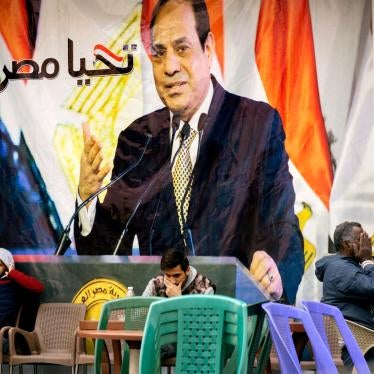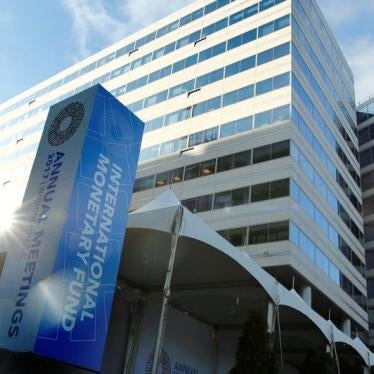(Washington, DC) — The International Monetary Fund’s new US$3 billion loan agreement with Egypt largely continues an economic approach that leaves the economic rights of millions unprotected, Human Rights Watch and Democracy in the Arab World Now (DAWN) said today.
The agreement includes improved efforts to address deep-seated structural problems such as the opaque role of the military in the economy and inadequate social protection. But other provisions, such as austerity and the sale of state assets, risk harming rights. This is the fourth loan that Egypt has received from the IMF since 2016.
“Egyptians are facing a cost-of-living crisis that has left millions struggling to afford food and other economic rights,” said Sarah Saadoun, senior researcher on poverty and inequality at Human Rights Watch. “The expansion of the cash transfer program under the new IMF program, while a positive step, does not do nearly enough to protect people from spiraling costs exacerbated by the program.”
The loan agreement, which the IMF’s Executive Board approved in December 2022 but only publicly published in January 2023, will provide Egypt with the equivalent of $3 billion over a 46-month period to help the government meet its budget and balance of payments amid rapidly deteriorating economic conditions. It is expected to catalyze another $14 billion in foreign funding.
Soaring Prices, Inadequate Protection
Over the past year, skyrocketing inflation and surging food and commodity prices have strained millions of Egyptians’ ability to access their economic rights. Egypt is one of the world’s largest importers of wheat, and disruption to these markets following Russia’s invasion of Ukraine has further undermined the nation’s chronically imperiled economy, which has still not rebounded from the effects of the Covid-19 pandemic.
In October, the Central Bank of Egypt announced a shift to a flexible exchange rate, a cornerstone of the IMF program, causing the pound to further depreciate by 23 percent and bringing the total depreciation since February 2022 to about 50 percent. This further increased the cost of importing items, endangering food security. By October, food prices had climbed by 37 percent from the previous year, and they continue to rise.
In 2020, the most recent year for which there is data, roughly one in three Egyptians –30 million people – lived below the national poverty line, according to Egypt’s Central Agency for Public Mobilization and Statistics (CAPMAS). This number has most likely increased due to the pandemic and ensuing economic crisis, particularly since the World Bank considered just under another third vulnerable to poverty.
Previous loan programs sought to rein in Egypt’s high debt-to-GDP ratio, which stood at 94 percent in 2016, in part by dramatically decreasing government spending. Since 2016, government spending dropped from 11.43 percent of GDP to just under 8 percent, including cuts such as to fuel subsidies that raised the cost of living. New revenues also relied heavily on value-added taxes, which can disproportionately hurt people in poverty. The current debt-to-GDP ratio is 88.5 percent.
According to the IMF staff report for the 2016 loan program, Egypt was expected “to mitigate the impact of the reforms on the poor” by “using part of the fiscal savings to strengthen the social safety nets.” However, a World Bank Public Expenditure Review in September 2022 found that the large budget savings “did not translate into real increases in spending on major [social assistance] programs, which remained stable at around 2.1 percent of GDP in FY2020.” The review also found that “spending on health, education and scientific research are low by international standards, and have been declining in real terms.”
With the help of the World Bank, the government established two new cash transfer programs, called Takaful and Karama, that provide support for families with children, older people, and people with disabilities. But these programs cover only a fraction of people living in poverty. In July 2022, President Abdel Fattah al-Sisi announced that these programs would expand to cover 5 million households, though World Bank figures indicate that 15 million households were living in or near poverty.
In a positive step, the new loan program includes a structural benchmark, which requires a waiver from the IMF Board if unmet, to complete this expansion by the end of January 2023. The program also includes a target to increase the social spending floor, defined as the budgets of the Ministries of Health and of Social Solidarity, to 153 billion pounds (US$5.1 billion on January 24, 2023) from 115 billion ($7.3 billion on February 1, 2022) the previous year. While an increase in nominal terms, depreciation erases these gains, making it inadequate to protect people’s economic rights from the combined impact of the program’s reforms, high inflation, and Egypt’s low social spending baseline.
“An increased social spending floor in the new IMF loan looks great on paper, but in the real world, the increase is a phantom, eviscerated by Egypt’s currency depreciation,” Saadoun said. “The IMF and Egypt should have adjusted the spending floor to ensure it is adequate to protect people’s rights.”
For example, the program includes a structural benchmark to reduce fuel subsidies following a recent increase to help people cope with rising prices. Moreover, the government committed to “explore further efficiency gains in our food subsidies,” which more than 70 million Egyptians rely on, including for government-subsidized bread. Spending on food subsidies in the loan agreement is projected to increase in nominal terms but to decrease from 1.2 percent of the GDP to 1 percent, indicating possible reforms.
Egyptian authorities also pledged to expand the coverage of their social registry, a database for identifying and determining eligibility for social benefits and services, to encompass 50 million people by the end of 2023. Given the significant coverage gaps for programs like Takaful and Karama, the expansion of Egypt’s social registry is an important step. However, the purpose of this expansion is to “introduce targeting in other social protection schemes,” despite a growing body of research that has shown that universal social protection programs are more effective at reducing poverty and inequality.
Opaque Military Business Dealings
Improving Egypt’s chronic economic woes largely depends on addressing deep-seated mismanagement that stems from the government’s prioritization of its political control, including the military’s growing and unaccountable role in the economy.
The Egyptian government completely shrouds from public view the financial dealings of massively expanded businesses owned by military agencies, which mainly produce civilian goods, making them ripe for corruption and undermining civilian oversight of the funding for Egypt’s military, which is responsible for serious abuses. The government has also used repressive measures to protect the military’s economic power.
In a positive departure from past practice that is consistent with recommendations that Human Rights Watch and partners have regularly shared with the IMF, the Fund’s agreement with Egypt includes some steps to increase transparency of state-owned assets, which it specifies includes “military-owned companies.” For example, all state-owned enterprises will be required to submit financial accounts biannually to the Finance Ministry that would be made public along with data on any subsidies they receive. The government also agreed to publish all public procurement contracts exceeding 20 million pounds. Notably, they did not commit to include beneficial ownership information – that is, who actually controls the company – for companies awarded contracts, which they had committed to do under an earlier loan program.
However, implementation will be key. The Egyptian government failed to shrink the role of the military in the economy or make it more transparent and accountable under previous programs. In fact, the Fund accepted reporting from the Egyptian government on state-owned enterprises that excluded military-owned businesses as well as flawed procurement disclosures related to its Covid-19 spending.
Moreover, the program’s heavy emphasis on the sale of government assets may risk corruption that benefits countries with abusive human rights records. Egypt is expected to raise $8 billion from the sale of state assets, largely to Gulf countries. In July, Saudi Arabia purchased minority stakes in four companies for $1.3 billion. There is a long history of such sales being used to enrich the political elite including in Egypt.
While the loan agreement includes some important steps to reduce corruption risks, such as depositing proceeds from such sales in an earmarked account in the Central Bank of Egypt, the Fund is limited in its ability to ensure the accuracy of valuations. Moreover, Gulf countries with abusive human rights records have a history of using financial support to create pressure on these countries to support the Gulf countries’ regional policy goals, including cracking down on independent groups such as the Muslim Brotherhood or supporting the Saudi- and UAE-led coalition’s military operations in Yemen.
“The Egyptian military’s sprawling and unaccountable role in the economy poses serious rights risks, and it is good news that the IMF is finally seeking to shed light on them,” Jon Hoffman, Research Director at DAWN, said. “But large-scale sales of state assets without effective regulation and transparent oversight risk benefiting states with abusive human rights records.”








